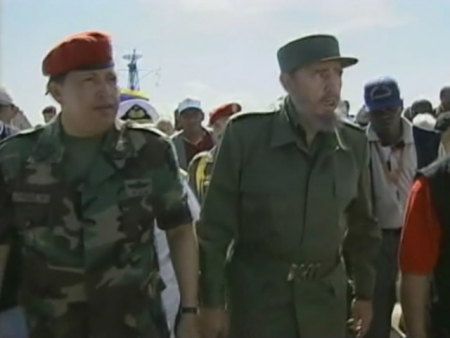
Venezuela leader Hugo Chavez brought his country's oil and petrodollars to aid Fidel Castro's Cuba during the Special Period. /CGTN Photo
But for Delia Lopez, it was the blackouts which hurt the most.
"The blackouts were like a sword striking at the heart of Cubans during the Special Period. Because in the heat of the summer months here, it's almost impossible to live without an electric fan," she said.
Every weekend as dusk falls, hundreds of young Cubans gather at the seawall along Havana's famous boulevard, el Malecon. It's a favorite meeting spot. Many stay until the early hours of the morning taking in the cool sea breeze.
During the Special Period, the seven-kilometer seawall was packed each night with entire families, including grandparents and children. It was the only way to escape the stifling heat of their apartments without electricity. Others would go and sleep on the flat roofs of their buildings.
For Delia Lopez, those nights outdoors fostered a sense of solidarity.
"Going out onto the streets at night, we all became closer. We organized games for the children, chatted and told jokes, played dominoes and so forth. It was a social response to the blackouts," she said.
The hardships also saw thousands flee the island on makeshift boats in a bid to find a better life in the United States.
The US reacted by tightening the trade embargo, hoping to push Cuba to the brink of collapse and bring about government change.
But the system survived.
Economist Juan Triana believes that unity in the form of a constant dialogue between Fidel Castro and the people was one of the keys to survival.
"Many blamed the US for the collapse of the Soviet Union and felt that our sovereignty, independence and values were under attack. Socialist or not these were our own values we had fought hard for," Triana said.
Another factor, according to Triana, was Fidel Castro's willingness to accept radical changes such as foreign investment in order to survive.
Cuba opened its doors for tourism for the first time since the revolution with European companies investing in hotel chains. Castro also allowed small scale private enterprises for the first time in the tourist sector, including family-run restaurants and bed and breakfast lodgings.
Many though were forced to close once the economy finally started to improve.
It did though set the stage for the more widespread economic openings after his brother Raul Castro came to power.
Eventually, a new benefactor stepped in, Venezuela's Hugo Chavez, who used his oil and petrodollars to come to Cuba's aid.
The man widely expected to take over from Raul Castro as the next president of Cuba on April 19, is 57-year-old Miguel Diaz-Canel.
In the early 1990's, at the height of the Special Period, Diaz-Canel was the provincial communist party leader in Villa Clara – the equivalent of a state governor in the United States.
Diaz-Canel built a reputation as a "man of the people" because instead of using his official Soviet-made Lada car for state business he did what the rest of the population had to do and went everywhere by bicycle.
He may need those skills once again.
These days, Venezuela is in crisis and can no longer afford such generous assistance while the US, under President Donald Trump, is once again trying to pressure Cuba to change.
Cuba was never as dependent on Venezuela as it was on the Soviet Union, and today, it has commercial ties with a whole range of countries including China and the European Union.
But the economy is struggling and for many, times remain tough.
Diaz-Canel does not have the same authority and legitimacy as the Castro brothers. He will be the first Cuban leader who is not part of the "historic generation" who fought in the Cuban Revolution.
The experience of the Special Period points to the resilience of the Cuban people but for how much longer? Diaz-Canel's presidency could well be defined by his ability to turn the Cuban economy around.
By Michael Voss


















































